Are we alone? Nobel Prize goes to three who tackled cosmic query
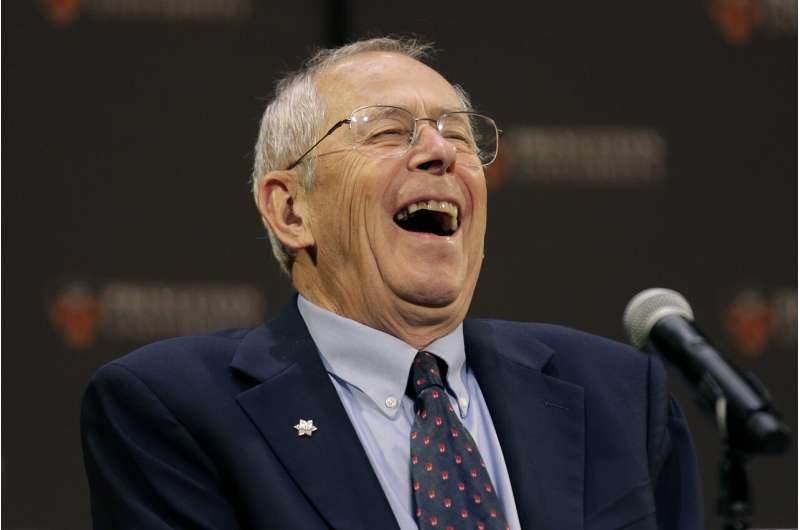
They are two of the most fundamental questions not just of science, but of humanity: How did we get here? And are we alone?
A Canadian-American cosmologist and two Swiss scientists split this year's Nobel Prize in Physics on Tuesday for not quite answering those universal questions, but getting closer to the cosmic truths.
Canadian-born James Peebles, 84, an emeritus professor at Princeton University, won for his theoretical discoveries in cosmology, about what happened soon after the Big Bang that eventually led to the formation of galaxies and the universe as we know it.
Swiss star-gazers Michel Mayor, 77, and Didier Queloz, 53, both of the University of Geneva, were honored for finding an exoplanet—a planet outside our solar system—that orbits a sun-like star.
A day of deep astrophysics and talk of extraterrestrial life also included pop humor, with the Nobel Prize committee quoting from the theme song of the American TV sitcom, "The Big Bang Theory," whose protagonists, Sheldon and Amy, won a physics Nobel in the series finale, and a giggling Peebles referring to singer Bob Dylan.
"This year's Nobel laureates in physics have painted a picture of the universe far stranger and more wonderful than we ever could have imagined," said Ulf Danielsson of the Royal Swedish Academy of Sciences, in announcing the laureates. "Our view of our place in the universe will never be the same again."
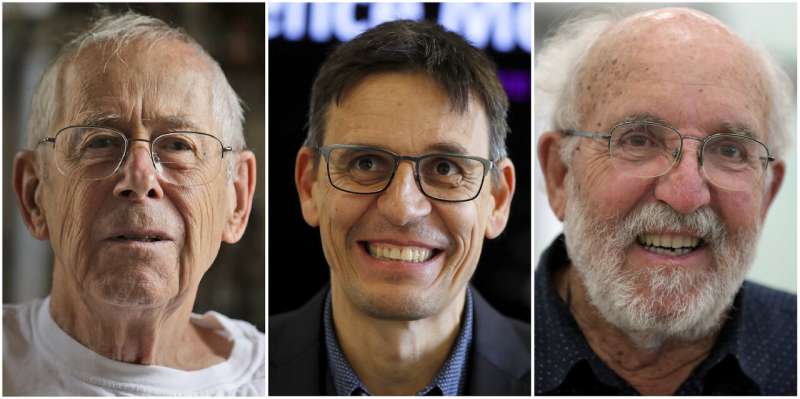
Peebles' work is a deeply theoretical look back in time and space at how the universe came to its current form, mostly filled with dark matter and dark energy we can't even see. It's probably the first Nobel for purely theoretical cosmology, instead of something observed, noted CalTech physicist Sean Carroll.
Peebles, hailed as one of the most influential cosmologists of his time, who realized the importance of the cosmic radiation background born of the Big Bang, will collect one half of the 9-million kronor ($918,000) cash award.
"Much of it will go to charity," Peebles told colleagues at a Princeton news conference. Then after a pause, he changed that to "Some of it will go to charity. Some of it will go to our children."
Mayor, who is an astrophysicist, and Queloz, an astronomer who is also at the University of Cambridge in Britain, will share the other half. Their finding of the first planet outside our solar system circling a star like our own made astronomers look harder for life elsewhere in the universe.
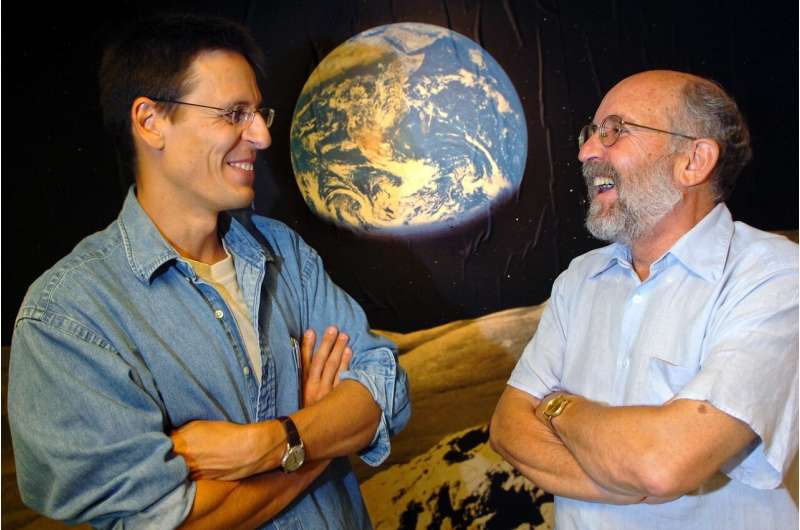
"Maybe we can discover some form of life. We don't know what kind of form," Mayor said Tuesday as he arrived in Madrid for a scientific speaking engagement. He said scientists "are absolutely certain that a lot of these planets have good conditions for life."
Mayor and Queloz started a revolution in astronomy when they discovered 51 Pegasi B, a gaseous ball comparable with Jupiter, in 1995—a time when, as Mayor recalled, "no one knew whether exoplanets existed or not."
That was "the first step in our search for, 'Are we alone?'" said astronomer Lisa Kaltenegger, director of the Carl Sagan Institute at Cornell University.
More than 4,000 exoplanets have since been found in the Milky Way, and scientists think one out of every four or five stars have planets. "We have 200 billion stars out there in our galaxy alone, so I like our chances," Kaltenegger said.
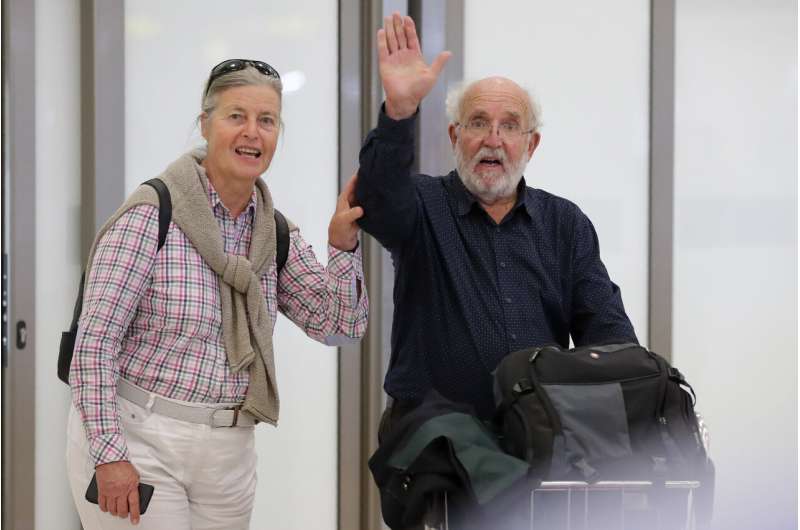
Queloz was meeting Tuesday with other academics interested in finding new planets when the press office at Cambridge University interrupted to tell him the big news: He had won the Nobel. He thought it was joke at first.
"I could barely breathe," Queloz told The Associated Press. "It's enormous. It's beyond usual emotions. My hand was shaking for a long time. I'm trying to digest it."
Geoff Marcy, who headed one of the teams that rivaled Mayor and Queloz, praised their work. In the 1990s "we were all trying to carry a search for planets without ever thinking we would succeed," Marcy said. "None of us imagined even finding one, never mind the thousands we found."
Marcy, who left the University of California Berkeley after accusations of sexual harassment, said he didn't know if he would have shared in the prize if it weren't for the scandal.
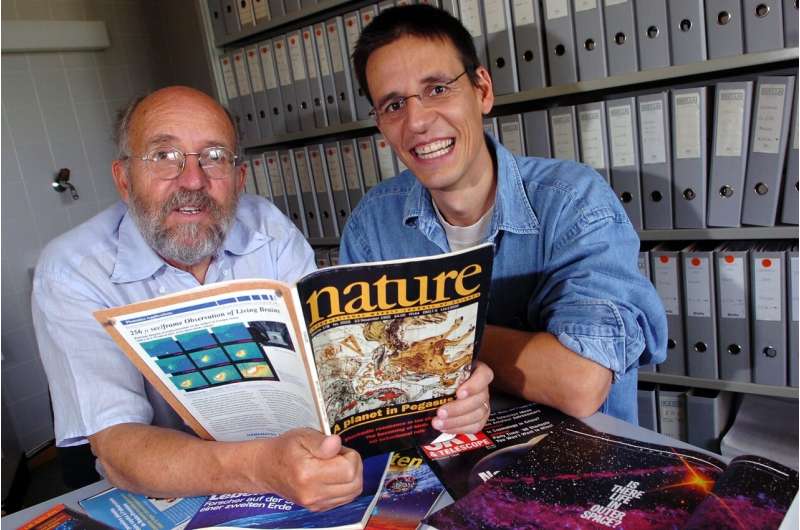
Swedish academy member Mats Larsson said this year's was "one of the easiest physics prizes for a long time to explain."
That can't quite be said for Peebles' theoretical work.
"Jim Peebles absolutely was one of the leaders in trying to understand how did we get here, the nature of cosmology, the nature of the universe at large," said astronomer Dimitar Sasselov, director of Harvard University's Origins of Life Initiative.
Peebles' work, which began in the mid-1960s, set the stage for a "transformation" of cosmology over the last half-century, using theoretical tools and calculations that helped interpret traces from the infancy of the universe, the Nobel committee said.
A clearly delighted Peebles giggled repeatedly during a phone interview with AP, recalling how he answered a 5:30 a.m. phone call from Stockholm thinking that "it's either something very wonderful or it's something horrible."
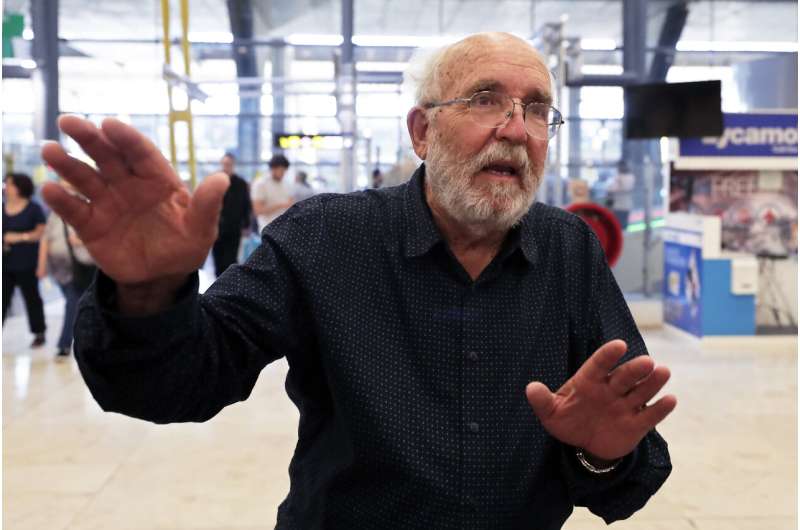
The astrophysicist, who said his life had suddenly turned topsy-turvy, will make sure he picks up his prize.
"I've always loved Bob Dylan," he said, referring to the singer-songwriter who won the literature prize in 2016 but refused to participate in the Nobel ceremony. "I can't forgive him for not showing up to the scene of (his) Nobel prize."
And in a case of life imitating art, Tuesday's Nobel Prize announcement included the opening lyrics of "The Big Bang Theory" theme song: "Our whole universe was in a hot, dense state, then nearly 14 billion years ago, expansion started."
The sitcom was a "fantastic achievement" that brought the "world of science to laptops and living rooms around the world," said Goran Hansson, secretary general of the Royal Swedish Academy of Sciences. So referencing its theme song seemed fitting, he said.
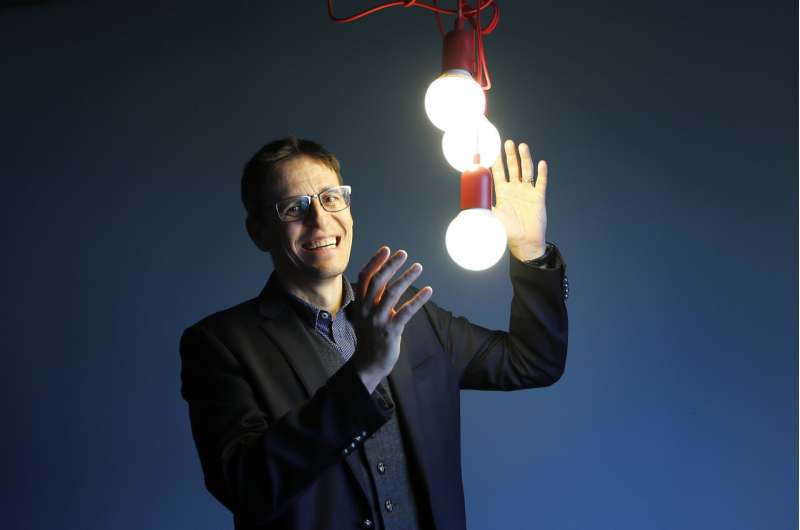
The cash prize comes with a gold medal and a diploma that are received at an elegant ceremony in Stockholm on Dec. 10, the anniversary of the death of prize founder Alfred Nobel in 1896, together with the winners of five other Nobel prizes. The sixth one, the peace prize, is handed out in Oslo, Norway, on the same day.
On Monday, Americans William G. Kaelin Jr. and Gregg L. Semenza and Britain's Peter J. Ratcliffe won the Nobel Prize for Physiology or Medicine, for discovering details of how the body's cells sense and react to low oxygen levels, providing a foothold for developing new treatments for anemia, cancer and other diseases.
Nobel, a Swedish industrialist and the inventor of dynamite, decided the physics, chemistry, medicine and literature prizes should be awarded in Stockholm, and the peace prize in Oslo.
-
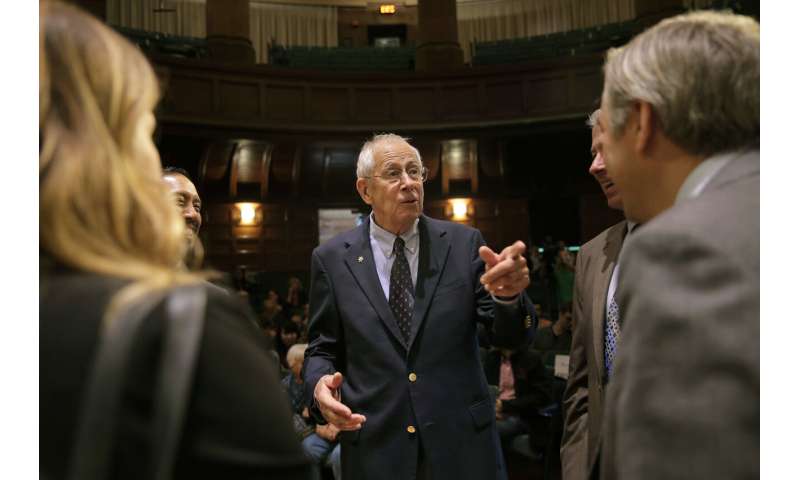
James Peebles, a 2019 Nobel laureate in physics, speaks with people before the start of a news conference at Princeton University in Princeton, N.J., Tuesday, Oct. 8, 2019. Peebles, an emeritus professor at Princeton University, shares the Nobel prize with Swiss scientists Michel Mayor and Didier Queloz for their work in understanding how the universe has evolved from the Big Bang and the blockbuster discovery of the first known planet outside our solar system. (AP Photo/Seth Wenig) -
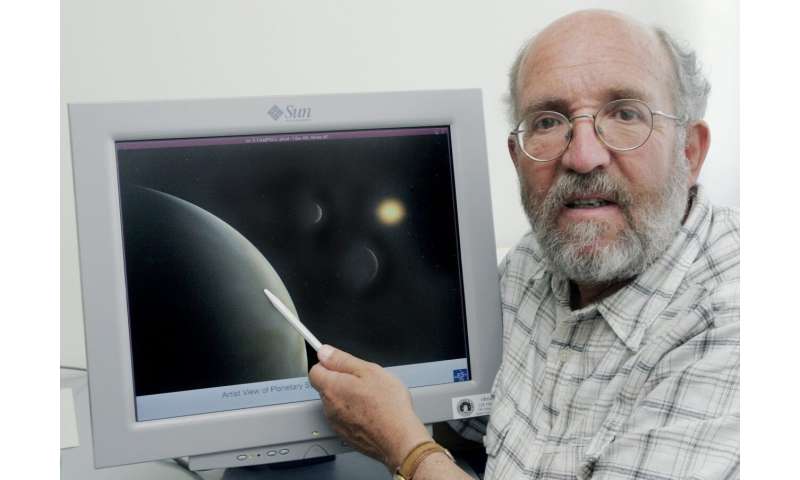
Wednesday, May 17, 2006 file photo of Swiss professor Michel Mayor, astrophysicist and director of the Geneva Observatory. The 2019 Nobel prize for Physics was given to James Peebles "for theoretical discoveries in physical cosmology," and the other half jointly to Michel Mayor and Didier Queloz "for the discovery of an exoplanet orbiting a solar-type star," said Prof. Goran Hansson, secretary-general of the Royal Swedish Academy of Sciences that chooses the laureates. (Salvatore Di Nolfi, Keystone via AP) -
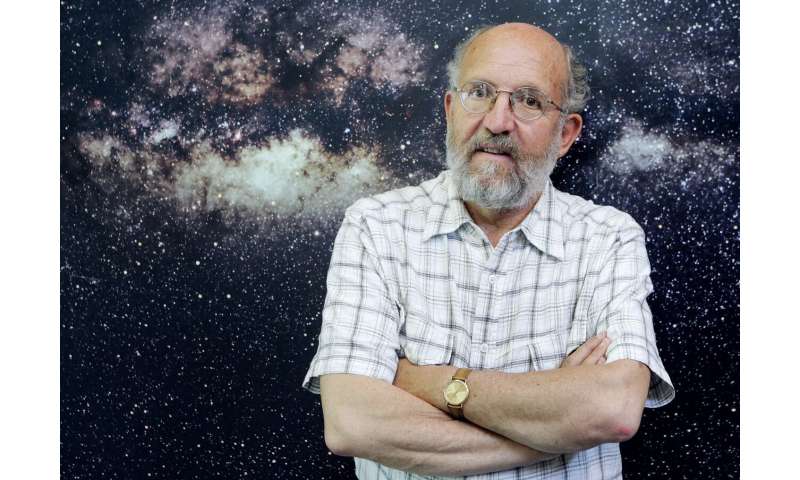
In this Wednesday, May 17, 2006 file photo Swiss professor Michel Mayor, astrophysicist and director of the Geneva Observatory, poses in front of the picture of the Milky Way, in Geneva, Switzerland. The 2019 Nobel prize for Physics was given to James Peebles "for theoretical discoveries in physical cosmology," and the other half jointly to Michel Mayor and Didier Queloz "for the discovery of an exoplanet orbiting a solar-type star," said Prof. Goran Hansson, secretary-general of the Royal Swedish Academy of Sciences that chooses the laureates. (Salvatore Di Nolfi, Keystone via AP) -
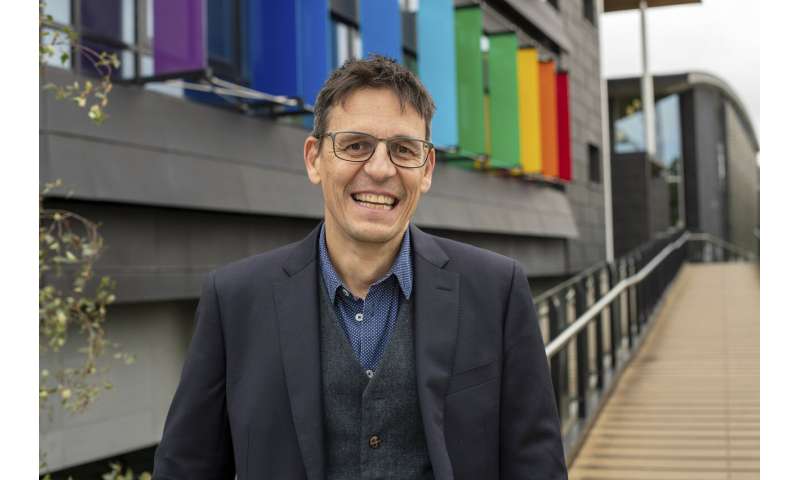
In this image provided by Cambridge University showing Didier Queloz, 53, Tuesday Oct. 8, 2019, after he was named as a recipient of the 2019 Nobel Prize in Physics. Canadian-American cosmologist James Peebles and two Swiss scientists, Didier Queloz and Michel Mayor, have jointly won this year's Nobel Prize in Physics on Tuesday for their work in understanding how the universe has evolved from the Big Bang, and the Earth's place in it. (Cambridge University via AP) -
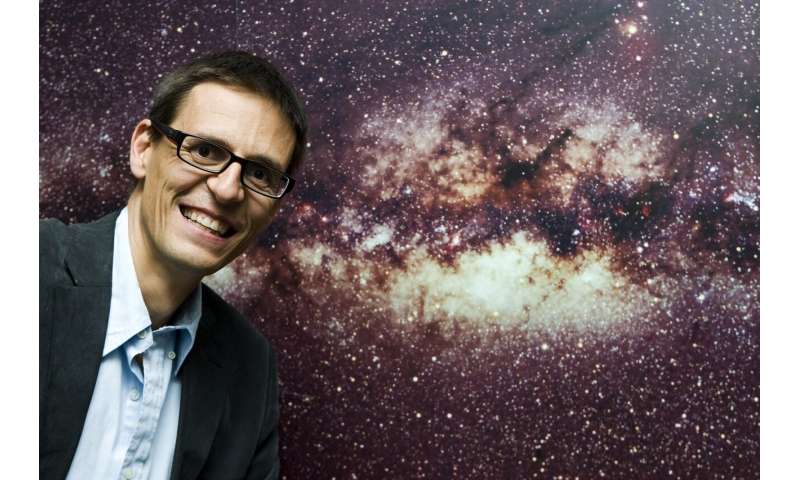
In this Wednesday, Sept. 16, 2009 file photo Swiss astrophysicist Didier Queloz poses in front of the picture of the Milky Way at the Geneva Observatory in Geneva, Switzerland. The 2019 Nobel prize in Physics was given to James Peebles "for theoretical discoveries in physical cosmology," and the other half jointly to Michel Mayor and Didier Queloz "for the discovery of an exoplanet orbiting a solar-type star," said Prof. Goran Hansson, secretary-general of the Royal Swedish Academy of Sciences that chooses the laureates. (Salvatore Di Nolfi, Keystone via AP)
The Nobel Prize for Chemistry will be announced Wednesday, two Literature Prizes will be awarded on Thursday, and the Peace Prize comes Friday. This year will see two Literature Prizes handed out because the one last year was suspended after a scandal rocked the Swedish Academy.
© 2019 The Associated Press. All rights reserved.



















